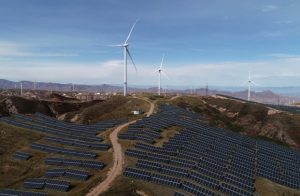Some of the world’s biggest oil companies are abandoning promises to shift to renewable energy, and planning to expand their fossil fuel exploration despite growing call for an urgent energy transition.
Top energy companies including BP, Shell, Exxon and Chevron doubled down on oil and gas in 2024 to focus on near-term profits.
That shift came at the cost of their plans to decarbonise — a trend that is on track to continue into 2025.
Also on AF: China Plunders Rare Earth Minerals as Myanmar’s Civil War Rages
European Big Oil firms BP and Shell sharply slowed their plans to spend billions on wind and solar power projects this year and shifted spending to higher-margin oil and gas projects.
That was despite both firms lobbying for billions of dollars in subsidies for carbon capture, a climate technology aimed at capturing CO2 emissions from large sources, such as oil refineries. Climate experts say the technology cannot be a substitute for targeted emission reductions.
BP, which had aimed for a 20-fold growth in renewable power this decade to 50 gigawatts, announced in December it would spin off almost all its offshore wind projects into a joint venture with Japanese power generator JERA.
Shell, which once pledged to become the world’s largest electricity company, largely stopped investments in new offshore wind projects, exited power markets in Europe and China and weakened carbon reduction targets.
Shell told Reuters it remained committed to becoming a net zero emissions energy business by 2050 and continues to invest in the energy transition.
Meanwhile, Norway’s state-controlled Equinor also slowed spending on renewables.
BP, Shell and Equinor reduced low-carbon spending by 8% in 2024, Rohan Bowater, analyst at Accela Research, told Reuters.
Similarly, American big oil firms Exxon and Chevron have also firmed up their commitment to fossil fuel expansion.

Early this month Exxon Mobil said it was looking to increase its oil and gas output by 18% between 2026 and 2030. It is looking to increase its earnings by 2030 by $20 billion over this year’s projected $34.2 billion.
Meanwhile, Chevron increased its oil and gas volumes by 7% year-over-year, while planning to cut back spending on low-carbon projects by 25%.
Both Exxon and Chevron are now planning to enter the electricity business eyeing increasing energy demands at data centres, fuelled by an artificial intelligence boom. The firms are looking use natural gas to power the technology industry’s AI data centres.
Researchers say the carbon footprint of natural gas is 33% worse than that of coal.
Faltering policies
The retrenchment by oil majors comes after governments around the world slowed the rollout of clean energy policies and delayed targets as energy costs soared following Russia’s full-scale invasion of Ukraine in 2022.
European oil giants that had invested heavily in the clean energy transition found their share performance lagging US rivals Exxon and Chevron, which had kept their focus on oil and gas.
“Geopolitical disruptions like the invasion of Ukraine have weakened CEO incentives to prioritise the low-carbon transition amid high oil prices and evolving investor expectations,” Accela Research’s Bowater said.
Meanwhile, Equinor blamed supply-chain bottlenecks and high prices for its slow moves on wind energy.
“The offshore wind segment has been through demanding times in the last couple of years due to inflation, cost increase, bottlenecks in the supply chain,” Equinor told Reuters.
The company “will continue to be selective and disciplined in our approach,” it added.
The scenario is the same in the US, where both Exxon and Chevron have blamed a lack of “clarity” on rules on energy subsidies for holding back investments in climate technologies and renewables.
Tougher days ahead
Global heat-trapping carbon emissions are forecast to climb to a new high in 2024, which will be the warmest year on record.
And 2025 is shaping up to be another tumultuous year for the $3 trillion energy sector, with climate-sceptic Donald Trump returning to the White House.
China, the world’s biggest crude oil importer, is also trying to revive its faltering economy, potentially boosting oil demand.
Meanwhile, Europe also faces continued uncertainty over the war in Ukraine and political turmoil in Germany and France.
All those tensions were laid bare at the annual United Nations climate conference in Baku in Azerbaijan in November, when the host country’s President Ilham Aliyev, hailed oil and gas as “a gift from God”.
That summit yielded a global climate finance deal but disappointed climate advocates who had hoped governments would coalesce around a phase-out of oil, gas and coal.
The energy companies will be watching to see if Trump follows through on promises to repeal President Joe Biden’s landmark green energy policies, which have spurred investments in renewables across the United States.
Trump has vowed to remove the United States from global climate efforts, and has appointed another climate sceptic, oil executive Chris Wright, as his energy secretary.
Oil and gas pitfalls
Despite those concerns, however, there are potential pitfalls in the energy majors’ renewed emphasis on oil and gas.
Demand growth in China, which has driven global prices for two decades, is slowing, with growing signs that its gasoline and diesel consumption is plateauing.
At the same time, OPEC and top oil producing allies have repeatedly delayed plans to unwind supply cuts as other countries, led by the United States, increase oil output.
As a result, analysts expect oil companies to face tighter financial constraints next year. Net debt for the top five western oil giants is expected to rise to $148 billion in 2024 from $92 billion in 2022, based on LSEG estimates.
There is also mounting regulatory pressure on oil companies, with states like New York planning to fine fossil fuel companies a total of $75 billion over the next 25 years to pay for damage caused to the climate.
Meanwhile, climate experts have warned that continued investments in fossil fuels create the risk of assets worth $557 trillion being left useless by 2050.
Researchers say no new fossil fuel projects are needed for the world to reach net-zero emissions by the middle of the century.
- Reuters, with additional editing and inputs from Vishakha Saxena
Also read:
Saudi, Oil Producing States Block Hopes for UN Plastics Treaty
Asian Steelmakers Failing on Shift to Renewables, Survey Finds
Energy Emissions Set to Peak But ‘Not in Time’ For Climate Goals
Asian Economies at Risk From Inaction on Climate Change: ADB
Fossil Fuels Set to Drive Global Emissions to a Record, Yet Again
Emissions of World’s Super Rich ‘Drive Economic Losses, Deaths’
What Will Donald Trump Mean For Global Carbon Markets?
Hope Grows China Emissions May Have Peaked – or Will Next Year
Lacklustre COP29 Deal Shows Strains of Climate Cooperation
Arctic Tundra Now Emits More Carbon Than it Stores
























